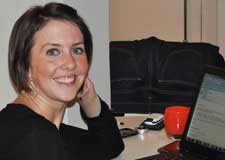 |
|||
| College of Education Home | News & Events | Make a Gift | UW Alumni | |||
|
February 2011 | Return to issue home
Anne Grant-Anderson Stands for Children
Anne Grant-Anderson always had a bent for policy and government affairs. So it wasn’t a complete surprise when she pursued a policy career after serving as a teacher in Washington state. With a UW undergraduate degree in political science, a UW Master’s in Teaching, and several years of teaching experience under her belt, she found that she was prepared to lead difficult conversations with community members and to gain the trust of fellow teachers. Stand for Children, a grassroots child advocacy organization based in Seattle, Wash., gave Grant-Anderson the opportunity to work on legislation and advocacy projects such as the Beginning Educator Support Team legislation, which provided funding for new educators in eight districts. She also works with community organizers who educated Stand for Children members and leaders, teaching them how to talk with legislators or take other actions within the system. And along the way, she drew purpose from the very people Stand worked to educate. "Parents, teachers, and community members define our mission," Grant-Anderson explains. "It's not just one person but a whole group that are looking at education from a different perspective, looking at systematic change at local and policy levels. Our members are most interested in passing levies or legislation that will have real results for kids." One of Grant-Anderson’s most fulfilling projects was the creation of an Educator Advisory Team. The 14-member group, which included different types of educators from across the state, met regularly to develop a three-year policy agenda. They discussed potential policies to improve education and what laws might ensure that all kids could get a quality education. The conversations were brutally honest and touched on hot topics like teacher or principal evaluations as well as teacher compensation. Ultimately, the group created a list of policy priorities that Stand for Children’s membership voted as a strategic plan for the organization. Read the agenda. "The project was amazing," Grant-Anderson explains. "The fact that I had gone to the College of Education and had been a teacher gave me creditability and demanded trust of teachers in that room. I think very often that other groups may not be able to have open conversations with teachers because teachers don’t feel that the groups 'get it.' As a former teacher, I 'get it' and know firsthand that teachers need to be involved in changes that affect them." Grant-Anderson went straight into the Master’s in Teaching program after receiving her UW undergraduate degree in political science. As an undergraduate, she co-founded the Future Educators Club (FED) with Eugene Edgar. The group provided information on becoming a teacher to undergraduates before the College offered a major in Early Childhood and Family Studies or a minor in Education, Learning & Society. They were a resource for admission FAQs and volunteer opportunities, providing everything from panels of alums to hands-on discussions about the teaching experience. This work, along with Edgar’s course on educational systems sparked Grant-Anderson’s fire to become a teacher. Then she received a Zesbaugh scholarship, which she worked on with Brad Portin. Grant-Anderson says the Zesbaugh work taught her "how to do" teaching. A constant in Grant-Anderson’s work, both personally and professionally, has been her focus on understanding the system, on improving education by looking at the system itself. "Most people go into teaching because they care about kids and learning," Grant-Anderson states. "But I also joined the UW Teacher Education Program because it makes you think about the system. It forces you to think about your classroom and how you plan to teach within those four walls in addition to how your work fits into the bigger picture." Grant-Anderson believes that public education is a great equalizer. Ultimately, she says, our education system should serve all children. "Our priority should be figuring out what we need to do to make sure that we don’t let kids slip through the cracks," she asserts. "We may need to do things differently or be open to new ways of running schools or making systems move.…Our global economy is so interconnected that we are failing our students if we aren’t competing with the level of education provided by other countries. I’m optimistic, but I know that our system has cracks. Collectively, we can improve our schools." If you’d like to learn more about Stand for Children and how you can get involved find out now. February 2011 | Return to issue home | |||
|
|||
